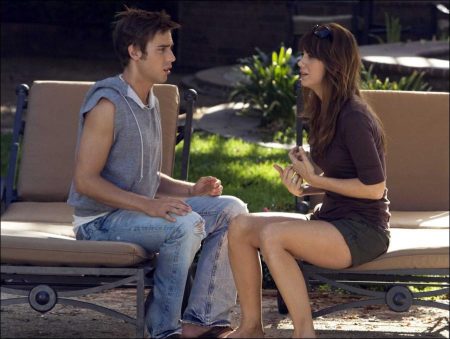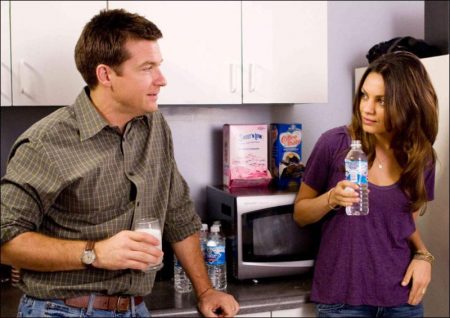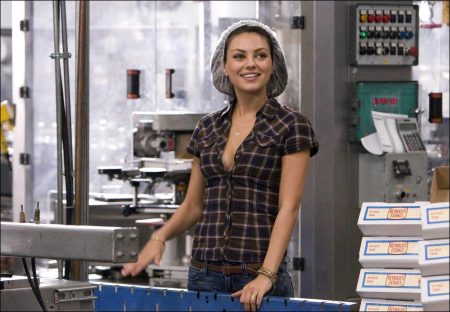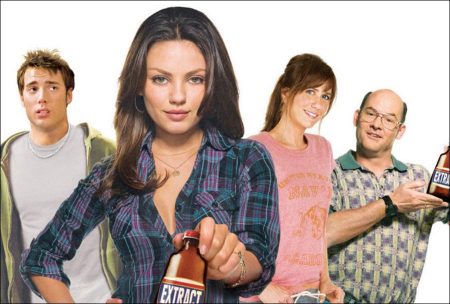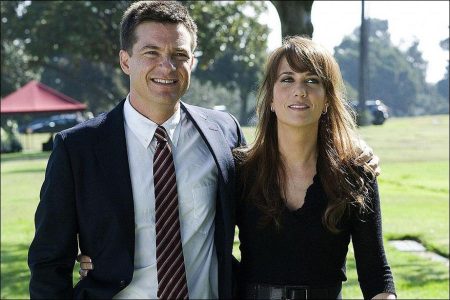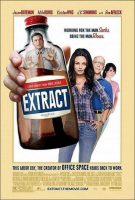Tagline: Working for the man sucks. Being the man blows.
A small business owner employs an odd cast of losers, loners and misfits in his flavor extract factory. To the outside eye, Joel Reynold (Jason Bateman) seems to have everything. After all, being the owner of a business he built from the ground up – with its patented brand of culinary extracts – should make the “Extract King” a happy man.
However, if Joel hasn’t reached his front door by 8 o’clock, he’ll find his wife, Suzie (Kristen Wiig) cinching up her sweatpants – and about as interested in him as he is in her mastery of supermarket coupon design. Sexually frustrated, Joel confides in his best pal, Dean (Ben Affleck), a barkeep – and soon finds himself wrapped up in a convoluted scheme to make Suzie cheat on him first with a dim-witted gigolo (Dustin Milligan) – thereby allowing him to pursue beautiful new employee Cindy (Mila Kunis) with a clear conscience. Unbeknownst to Joel, the object of his affections is a con artist/sociopath.
Meanwhile, Joel and his second-in-command, Brian (J.K. Simmons) have entered negotiations for a buyout of Reynold Extracts by General Mills. All they need to do is keep things tidy, quiet and moving while waiting for the final offer. Of course, this fails to take into account the employees on the factory floor: Step (Clifton Collins, Jr), a machismo-ridden doofus and self-proclaimed “fastest sorter” with lofty aspirations of rising to Floor Manager; Rory (T.J. Miller), a goth-rock geek who spends more time passing out flyers for his band than shuffling extract bottles; and Mary (Beth Grant), a fanny-packed, bitter slouch at the end of the assembly line who’d rather fold her arms and shake her head than keep life at Reynold moving along – which is exactly what she’s doing when a bottleneck occurs on the line, resulting in a chain of accidents that cost poor Step a portion of his manhood.
Seeing a big payday, the con-artist temp woos the otherwise-loyal Step, convincing him to sue for millions, engaging bus bench lawyer Joe Adler (KISS’s Gene Simmons) to “fight for his rights” – regardless of the fact that doing so will cost Joel the factory. With his dry wit and remarkable ear for character and dialogue, Mike Judge brings his trademark “flavor” to these seemingly disparate threads, tying them together into an antic comedy about life in the middle.
About the Film
Ten years after the release of “Office Space,” a bona fide cultural landmark, Mike Judge is still rankled by the memory of a studio executive explaining to him that “nobody wants to see your little movie about ordinary people and their boring lives.” It was further explained that the movie was a huge failure, even though it made almost its entire budget back in its initial release. According to the studio, there was no problem with their confused release of the film on limited screens – instead it was all Mike Judge’s fault for thinking that “Office Space” might connect with people that were stuck in a work world they hated, just as he was at one time.
Mike was already about 40 pages into his follow up script, set in the world of an extract factory, when he was convinced by his representative team that he needed to shelve that and concentrate on something more “commercial.”
“The only idea that I had that anyone was interested in was what eventually became ‘Idiocracy,’” says Judge. “Everyone said ‘Oh, that’s a commercial idea; it’s high-concept. It’s set in the future and everyone’s stupid. That’s a big, booming, commercial idea.” The next several years were spent realizing his vision of a dysfunctional future – but by the time of the film’s release, audiences had decided they, in fact, did want to see Judge’s little movie about “boring people” – “Office Space” had struck a chord, becoming an enormous hit on basic cable and one of the most successful DVDs in history, quoted openly by fans who felt that someone was finally actually speaking for and to them.
“As we showed ‘Idiocracy’ to focus groups, they all said pretty much the same thing: ‘Oh, it’s funny, but we really wanted something more like ‘Office Space,’” Judge recalls. “That film spoke to a generation in a way that few movies have,” notes EXTRACT producer John Altschuler. “Nobody does this kind of material. It’s all about the weirdness of real people in real life.” In response, Judge dusted off those early pages of EXTRACT and showed it to his “King of the Hill” partners, Altschuler and David Krinsky,. “Dave and I read it, and we were, like, ‘This is vintage Mike Judge.”
Seeking to keep their new project below the radar of the studio system, the three set up a production company, Ternion Productions, and arranged private financing – while partnering with Miramax for domestic distribution. “That gave us the independence to do exactly what we wanted,” says Altschuler.
Meanwhile, Judge dug deeper into an industrial world he knew only too well: “I actually worked in a factory a little bit myself,” the director recalls. “I worked as an engineer in a company that made bass and guitar amps. There’s such a unique set of personalities in a factory setting. I just felt it would be a nice backdrop.”
“Mike and I are both addicted to watching shows like ‘Unwrapped’ on the Food Network, where you’re just watching chocolate bars being made,” says John Altschuler. “He wanted to do a movie where the background was that industrial world that is slowly disappearing, where things are actually being made.” Back home in Austin, Texas, Judge would regularly pass by the old Adams Extract plant. After finishing the script, he arranged for a factory visit and was happy to see it was as he imagined.
Assembling a cast for a Mike Judge project requires a group of actors who are able to tap into his specific blend of the real and surreal: “Mike wrote a script with incredibly vivid characters that are fun and funny without being jokey or stupid,” says Altschuler. “The characters are smart, interesting, and complex. Fortunately, we were able to find great comedic actors who could find all of those qualities in their characters and bring them to life.”
“I imagined very specifically who each character was, and I really worried whether I could get all these people,” says Judge. “It wasn’t going to be funny if the person didn’t do it exactly right, and I feel like we’ve nailed each one in this film, down to the littlest speaking parts.”
When writing EXTRACT, Judge initially didn’t have any particular actor in mind for Joel Reynold – which changed when the director finally had the opportunity to catch up with Jason Bateman’s work in “Arrested Development,” on DVD. “I knew right away this guy would really be Joel Reynold. I could totally see it,” Judge recalls.
Like a Texan Woody Allen, “Mike definitely focuses on who’s going to play what characters,” says actor Jason Bateman. “So intensely, in fact, that once he does decide, you know you’re not there by accident. He wants exactly what you do, so you just do that. Joel’s the classic protagonist that really doesn’t affect much. Most things happen to him and around him.” When Joel actually attempts to be pro-active in his relationship – using what Bateman classifies as “adult maneuvers” – the character’s own innocence backfires. “It ends up having the opposite effect, sending him backwards.”
“Jason is able to play an everyman,” says John Altschuler. “In the way that Jimmy Stewart or Tom Hanks are – you can identify with him. He has the comedic ability to look around at this world and convey that insanity without making it feel stupid.”
His co-stars often found Bateman’s subtle delivery would send them over the top while acting together, resulting in multiple takes while they attempted to recover. “Jason makes me laugh a lot,” says Kristen Wiig. “We had a couple of scenes where I ended up having laughing attacks, which scares me, because once I’m gone, I can’t come back.”
As Suzie Reynold, Wiig is the comic engine that drives much of the plot, requiring a measured performance, equal parts comic and tragic: “It could have become very dark, or it could have become very silly,” says Altschuler. “What she was able to do was not lose the comedy. You don’t feel like you’ve dropped into ‘Scenes From a Marriage.’ She kept it funny, kept the absurdity alive, but never once did you feel it wasn’t incredibly real.”
“She designs coupons, which I’m sure was her lifelong dream, and she’s been married to Joel for a handful of years and things are getting a little stale,” the actress explains. “I don’t think I know what’s going on for him at work, because I’m having an affair, and that takes up a lot of time. You don’t really ask your husband about his work when you’re sleeping around. You’ve got other things on your mind – like sleeping around.”
Though Judge was familiar with Wiig mostly through a couple of Saturday Night Live Digital Shorts, it was her deft comic readings that made him realize how well she would pair with Bateman. “She’s kind of a female Peter Sellers,” the director notes. “She’s one of those actors who can just do something a lot of different ways. One minute she looks like herself and the next she doesn’t at all. It’s an interesting quality.”
Bateman is quick to praise the specificity of his co-stars performance: “Once she ties the drawstring on her sweatpants, it’s kind of like hearing the jail doors close.” He credits the comic actress for overcoming the limitations of her wardrobe: “We tried lighting her bad, we tried a baggy pair of sweatpants, a shrunken pair. No matter what we tried, it was impossible to make Kristen Wiig look bad.”
The yin to Suzie’s yang – the one that Joel turns to after one too many tied drawstrings – is his reprobate best friend, Dean, a bartender at Scoreboards. “Dean is actually kind of a dangerous friend to have,” says Judge. “He can give you bad ideas earnestly and not mean any harm, but convince you that they’re good ideas and innocently lead you down the wrong path with no accountability.”
Dean’s solutions to all problems involve a gently-suggested drug of the day – offers that are constantly rebuffed by Joel. The plot turns, when just to shut him up, Joel finally relents – taking “ecstasy” that turns out to be horse tranquilizer – and awakens the next morning to realize he has agreed to hire a gigolo to lure his wife into infidelity. “Dean believes that drugs can really solve people’s problems, and that society is uptight,” says Judge. “If everyone just did things his way, the world would be okay. Obviously, that’s not true.”
Getting an actor like Ben Affleck to return to the low-key rhythms of Texas style filmmaking (having received his first big break in Richard Linklater’s “Dazed and Confused”) turned out to be easier than anyone expected. Recalls Altschuler, “Mike explained to him about how there’s this thing about these bartenders with, you know, this long, flowing Jesus hair, where they always seem to get women. Ben loved the idea and just ran with it.”
Cindy, the object of Joel’s lust is played by Mila Kunis, who describes her character as “a kleptomaniac, pathological liar. She’s very manipulative, very conniving, very sweet and very naïve.”
“Pretty girls live by a different set of rules than the rest of us,” Judge explains. “Nobody ever suspects her of anything, so she’s able to just get away with all kinds of stuff,” including ripping off a guitar from two bumbling salesmen in a music store who stumble over themselves while trying to serve her. “I actually remember being in a music store once and seeing this really hot girl come in, and the dynamic of the whole place changed. I couldn’t get anyone’s attention.”
Though she had played Jackie Burkhart for eight seasons on “That 70s Show,” it wasn’t until Judge saw Kunis alongside Jason Segel in “Forgetting Sarah Marshall” that he knew he’d found his Cindy. “I just thought, ‘Wow, this girl’s perfect.’ And she really wanted to do it, which was fantastic.” Says Kunis, “I’m a huge fan of Mike Judge’s from ‘Office Space,’ so I was, like, ‘Okay, this is a very easy decision.’ I told them I would do anything needed to be in this production – like craft service, or, say, acting.”
As a veteran of such dramatic films as “Capote”, “Tigerland” and “Traffic” – actor Clifton Collins, Jr. felt fortunate to let his comic side out opposite such an able comedienne — “She’s got a flawless sense of comedic timing that just comes out,” says Collins. “She’ll pretend it’s not even there, but she’s got such a hone on it. She’s so quick with improv – it’s just fun to throw the ball with her.”
Collins plays Step, described in the script as “a short, beady-eyed, Charles-Manson looking guy” who “makes everything he says sound as macho and important as possible.” “Step thinks he’s the fastest stacker around,” says the actor. “Ain’t nobody touch me. Can’t nobody else do it. You can’t just come out of school knowing how to do stacking boxes. They don’t teach it in school.’ Basically, Step ain’t the sharpest pencil in the box,” Collins admits.
On the line with Step is Rory, a bona fide indie rock geek with a face full of piercings and body covered in ink. “I’m sure it wasn’t a progressive thing,” says his alter ego, actor T.J. Miller, of Rory’s tattoos. “He was, like, ‘I finally have $800 – I’m getting eight tattoos.’”
While he can be coerced into doing his job running the forklift at Reynold Extracts, Rory’s main ambition is his fledgling music career, heading one of his five unimpressive bands: God’s Cock, Fight Head and Mistress of the Throat Biters among them. “Rory is a guy who is working at the factory until his grind core band takes off,” says Miller.
Miller was more than excited to be part of a Mike Judge project. “I grew up watching ‘Beavis and Butt-Head,’ and my parents raised me trying to prevent me from watching ‘Beavis and Butt-Head.’ So Mike was a big part of my upbringing.” Miller’s fandom for Judge isn’t lost on his director, the actor notes. “He won’t make eye contact with me. He will with other people when he’s really open, but not with me. I think I did too many ‘Beavis and Butt-Head’ impressions when I first met him.”
At the end of the production line is Mary – played by Beth Grant. A “button-pusher” in more ways than one – she is responsible for starting and stopping the line. “I believe Beth told me she had a job in a factory when she was younger, cutting the beaks off chickens so they wouldn’t peck each other,” notes Mike Judge. “She said there was a woman that worked there who was just like Mary. When she started doing that woman, I just said, ‘Okay, that’s perfect. Do the chicken beak lady.’”
Rounding out the workplace ensemble is Factory Supervisor Brian, brought to vivid life by omnipresent character actor J.K. Simmons. “J.K. Simmons was probably the last piece of the puzzle – where we just went ‘thank god’,” says John Altschuler. “Because this type of character – he loves the business, the company but he doesn’t know anybody’s name. Everybody’s “Dinkus” or “What’s-His-Name.” That could come across as just jokey or insensitive – but J.K. can pull off that matter-of-fact ‘business as usual’ comedy like nobody else.”
Perhaps no character in EXTRACT feels more like a signature Judge creation than the Reynold’s neighbor, Nathan, a man who could challenge Milton from “Office Space” in the category of “singular focus”.
“He’s based on a female neighbor I had at one point who literally would just stop cars,” Judge explains. “She would just plant herself in the window of your car and stay there and give you no choice but either be incredibly rude or listen to her for I don’t know how long.”
“Everyone knows a Nathan,” says Altschuler. “Who hasn’t driven around the block a few times waiting for a neighbor to go inside so you don’t have to talk to them? It’s the tyranny of that cheerfulness. That he’s going to force himself into your life.”
Nathan is played to soul-numbing perfection by SNL alum David Koechner – who brings his best to being the worst. “David is so talented as a comic actor,” notes Jason Bateman. “He makes all of that really believable. Just when you think it’s getting just too broad and too crazy and unbelievable, he keeps it all grounded. I think it’s my favorite character in the movie.”
The final complicating factor in Joel’s life is Brad, the dull-headed gigolo Dean hires to seduce his wife. In a scenario right out of a seventies porn flick, he poses as the new pool guy, and finds his advances all too welcome.
Never one to get the point – any point – no matter how many times something is repeated, Brad, as described by his alter ego, actor Dustin Milligan, “is a total buffoon. He has no clue. In some scenes, you think he understands what’s happening, and then the next line he delivers indicates, in fact, that he does not understand a damn thing.”
Casting a stupid, good-looking guy in L.A. seemed an easy task, though the producers found that was not actually the case. “We thought that this town was full of these handsome, good looking dopey actor guys, but it’s an incredibly difficult thing to actually pull off,” recalls John Altschuler. They found their answer in Dustin Milligan of the CW’s “90210” revamp. “What Dustin’s able to bring to it is that he’s a good looking guy, but he’s vulnerable and has a puppy dog quality that makes something that could be very offensive palatable,” something that was indeed Milligan’s goal with the character. Says the actor, “He’s an idiot, but there’s a little bit of sensitivity there, which I think is a lot of fun to play. I didn’t want him to be too over the top.”
That quality was reserved for Joe Adler, the bus bench lawyer Cindy hires to hopefully sue the pants off Joel and ruin his company, played by Gene Simmons – yes, THAT Gene Simmons – the tongue-wagging devil of a bass player from heavy metal legends KISS.
“Everywhere I’ve lived, there’s been some kind of local celebrity lawyer who just runs cheesy ads,” says Judge. “He’s on bus benches, he’s on billboards.” After hearing a message Simmons had left for his friend, director Robert Rodriguez, Judge thought, “He just sounded like he could be the head of a studio or a lawyer or something.” Judge had, in fact, described Adler in the script as “someone who looks like Gene Simmons.” “We read a bunch of people, and we had some good people, but we kept finding ourselves going, ‘We’re looking for somebody who’s got that thing.’ And we thought, ‘Well, let’s just have Gene Simmons.”
“The phone rang, and on the other side was Mike Judge, who says, ‘Hey, man, do you wanna be in my film?’” Simmons recalls. “I said yes.’”
Adler, like his alter ego – or vice versa – is belligerently certain of his abilities. “Mr. Adler is in somebody else’s office telling everybody how brilliant he is,” says Simmons. “How he’s hit the jackpot, how the rest of them are assholes for not listening to him about bus benches. And, of course, when the people who actually own the conference room he’s in come in, he treats them like guests in his house, which is the way it should be. I mean, this is Joe Adler’s world – you’re all just living in it.”
Gene’s fellow cast members were equally impressed with his portrayal. “If he weren’t already a rock legend, then he probably would have been a surprisingly effective lawyer,” states T.J. Miller. “I think he would be just as larger-than-life. I’m sure he would have his own reality show, with amazing commercials for law. Can you imagine that? ‘I’m Gene Simmons, and I’m gonna fight for your rights.’ And maybe you put the number of the law firm on the tongue.”
Jason Bateman quips, “Watch at awards time for Gene – you might see him in a tux next Spring,” a prediction Simmons does not protest. “I know the character’s gonna steal the movie – Joe Adler played by Gene Simmons,” he pauses. “I knew I could do that role justice.”
Across the board, what drew this cast together was the strength of the writing, of the humanity of the characters – and the accessibility of the situations they face: “Mike writes characters that maybe you’ve seen before, dialogue that you’ve probably heard before, and he just tweaks it,” explains Jason Bateman. “The comedy lies in the precise subtlety of who these characters are.” Producer Altschuler agrees. “Mike sees how funny crazy and annoying people like neighbors are, as well as the conflicts in your life. He says what you just think and builds that into strong dramatic comedic moments.”
“Most of these characters are played with enough eccentricities where they’re comedic,” notes Jason Bateman. “But not to the point where they are so weird that you don’t know somebody like them. That’s due largely to Mike’s writing, and a little to us actors hopefully not screwing it up. You just have to go with it and don’t wink – it’s very serious crap and not funny to the characters in the movie. It’s serious to them – and that’s the comedy of it.”
Clifton Collins compares this type of comedy to old-school style like that of veteran Sid Caesar. “It’s not so much situational. In Mike’s movies, it’s really about the people and just their state of being and the way that they are. He’s got such a humble, clear interpretation of what normal life is like. For those of us in Hollywood or New York, this way of living isn’t familiar to us, or comes off a little funny, and, you know what? Life is funny.”
In response, Judge simply states, “I hopefully write stuff that is recognizable as the archetypes of this world.” Keeping true to this baseline of reality, EXTRACT was shot in a working factory, in this case a water bottling plant south of Los Angeles, in the City of Commerce. “The guy who owns the place had all the machines and the infrastructure to make it look like an extract plant,” marvels Jason Bateman. “Apparently it was the slow season for water bottling, so he let us shoot there for a couple of weeks.” Only slight modifications to the factory floor were needed to augment the “office space” needed for required scenes.
“I wasn’t interested in making the movie if I couldn’t get the right location,” says Judge. “You can’t recreate a bottling factory on a soundstage. I feel like we really lucked out, because it was laid out exactly like I imagined it. In fact, from my tour of the extract factory a couple of years ago – I’m kind of proud of myself how many things I guessed at that are actually here.” Judge made sure to use the plant’s employees as extras in the scenes’ backgrounds.
“Those people were actually running, doing some bottling while we were shooting. There were people working on machines that were so loud in there they couldn’t hear anyone call ‘action’ or ‘cut.’ They were just doing their job.” While complicating the production, the background activity actually helped the actors in their performances. “It’s a working factory, so things are always moving,” says Altschuler. “The actors feel it, Mike feels it. The energy of being in a real place just fills it out. The sound was awful, but it makes the factory like a character in the film.”
Shooting on the factory “set” lead Judge to some epiphanies about what made the story resonate for him: “Office Space was told from the point of view of the employees looking up at management as the ‘bad guys’. This is told from the point of view of the owner of the place and the workers are the big pain in the butt to him. I think partly it was inspired by that point in my life where I suddenly had a large number of people working for me and realizing you can’t be a ‘cool guy boss’. It just doesn’t work. So this is my more sympathetic take on the boss.”
As their “boss”, Judge had plenty of enthusiastic fans among his cast. “Mike is very, very easy to work for, in that he just basically leaves you alone,” states Jason Bateman. “He’s a really sensitive director, something a lot of directors today lack,” says Clifton Collins. “He’s kind, he’s present, he’s always there for you, he’s always on point, and he’s a good judge of comedic timing.”
Having a director who also wrote the script as well as producing, made things all the more enjoyable for the cast. “Because it’s ‘his’ story, he’s pictured it while he was writing it,” says Kristin Wiig. “So he’s able to bring that to life. He already has that vision, so you trust it more. It’s his own interpretation of his own work.”
“Mike is one of these rare entities,” says John Altschuler. “He’s truly creative, but he loves what other people bring to the table. He’s not one of these ‘dark princes of comedy,’ all miserable and full of hate and anger. You can pitch him an idea, and there’s no ego. He gives people credit for what they do.”
Even Gene Simmons appreciated the absence of ego. “Mike Judge isn’t one of these guys running around saying, ‘Look, it’s me – I also direct and I write and please pay attention to me.’ He doesn’t do that.” Simmons holds Mike’s opinion in high regard. “Mike Judge is not only Mike Judge, he’s also the jury. There’s also Mike Jury running around someplace, but those are semantics, and I’m not anti-semantic.”
In the final analysis, Judge is clear that he hopes EXTRACT will resonate with audiences. “All the people in those focus groups of ‘Idiocracy’ that wanted another movie like ‘Office Space’ will be happy,” he says. “When ‘Office Space’ tanked at the box office, I thought, ‘Okay, I was born to do something that nobody wants to see,’ and then as it became popular, it was more and more gratifying. So I think I’m finally back doing what I think I was born to do.”
Extract (2009)
Directed by: Mike Judge
Starring: Ben Affleck, Jason Bateman, Clifton Collins Jr., Mila Kunis, Kristen Wiig, Dustin Milligan, Beth Grant, David Koechner, Lidia Porto, Gene Simmons, Lamberto Gutierrez, Matt Schulze
Screenplay by: Mike Judge
Production Design by: Maher Ahmad
Cinematography by: Tim Suhrstedt
Film Editing by: Julia Wong
Costume Design by: Alix Friedberg
Set Decoration by: Gene Serdena
Art Direction by: Austin Gorg
Music by: George S. Clinton
MPAA Rating: R for language, sexual references and drug use.
Distributed by: Miramex Films
Release Date: September 4, 2009
Visits: 58
